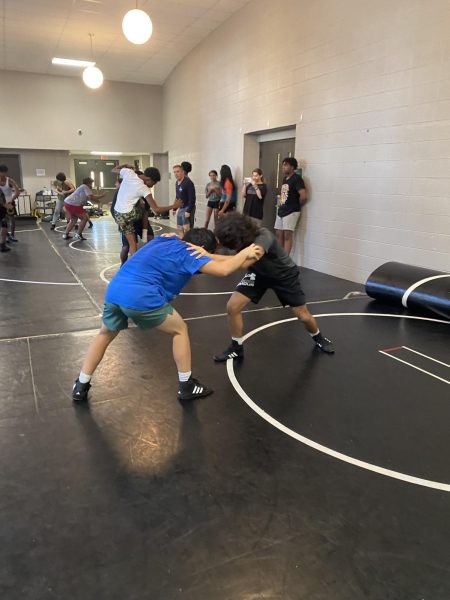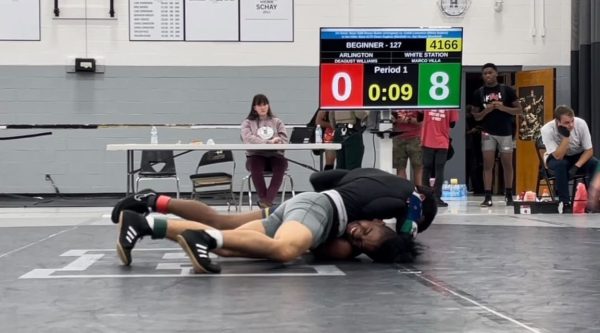
Two athletes, in the greatest shape of their lives, lock eyes. Looking at each other with determined eyes and stone-cold faces, they both know what to do. Months of preparation by changing their diet and harsh training have led to this moment. Clad in singlets and a square stance, they patiently wait for the referee to signal the start of the match. The referee sounds the whistle, and the war begins. The two wrestlers battle with will and strength as they take shots at each other. Each responds accordingly to the other’s moves.
Wrestling is a combat sport in which two individuals, usually in the same weight class, grapple each other in an attempt to pin the other to the ground. Points are accumulated through takedowns and other methods. Some wrestlers regard it as physically and mentally demanding, often requiring athletes to sacrifice various parts of their lives to be competitive.
“[Wrestling]’s tough.” Leont’e O’Neil (11) said. “You have to have a good mentality. You can’t be weak in the mind or physically.”
A wrestler must make many sacrifices to succeed. Cutting out all junk food and maintaining hydration, committing hours every day after school to practice, pushing their bodies every single day to their utmost limit and managing their time better to ensure they get at least eight hours of sleep.
“I am on my wrestlers just as much as I am on myself with being dedicated,” Coach Brendan Rye said. “If I want it I gotta go get it. Keeping that mentality is how I have kept it together.”
These sacrifices do not benefit the wrestlers in just the competition. The discipline learned and engraved into the brains of the wrestlers forever alters the way they approach challenges.
“My coaching style, and the messaging I bring into the room, are a little bit different because I will talk about the importance of preparation, and how preparation breeds success,” Wrestling coach Jim K

urtz said. “When I was around the world I was negotiating contracts with unions, foreign governments and other entities, I always knew that if I prepared I would win, and I would succeed. The discipline I learned from wrestling carried throughout my whole life…”
Kurtz hails from Chicago and started wrestling at a young age. Growing up without a lot of money meant his options were limited when it came to playing sports. Baseball wasn’t an option because he needed money for gloves and a bat; basketball wasn’t an option because he couldn’t afford the expensive shoes. However, Kurtz was given an offer to wrestle for free by a coach in his middle school district.
“I was successful throughout middle school, wrestled in high school, did very well again, and it allowed me to capture a scholarship to go to college,” Kurtz said. “I was the first person in my family and my area to go to college. Wrestling created opportunities for me that others didn’t have.”
After attending Christian Brothers University, Kurtz came full circle and returned to wrestling as a coach and mentor.
“I want to prepare [the wrestlers] for life,” Kurtz said. “Through the sport of wrestling, we are going to teach a lot of life skills. Number one: personal accountability. With personal accountability and personal responsibility, you have to pick yourself up. You have to work hard to achieve your dreams. What I want to see at the end of the season or the end of their wrestling career, is that they are on the right track. They have a solid foundation for success.”
More often than not, most wrestling coaches are coaching from the sideline. Kurtz however, enjoys a more hands-on approach. He runs sprints, demonstrates all of the techniques and does live wrestling with the wrestlers.
“Other coaches seem to be instructing more, I like hands-on,” Kurtz said. “When I’m working out with my team, I am trying to lead by example. I am not going to ask any of my players anything that I would not do with them. I think that provides me credibility with my players. If I push you really hard in practice, you will probably look to your left or right and see me doing the same thing. I think that shows we have a unique bond as coach and wrestler, and everyone finds a way to pull the rope harder when we are all in this together.”
Rye is an alumnus of White Station and works as the main office secretary. He is trained in MMA, Jiu-Jitsu and is a current MMA fighter. Training every day, Coach Rye works hard to balance his duties with the school and coaching, often coming home late at night.
“I am a MMA fighter,” Rye said. “[Wrestling] is very necessary in my line of work and hobbies that I need to know how to wrestle.”
Rye has current experience with various combat sports that are beneficial to the team. These experiences allow him to give different perspectives on wrestling. His proximity in age also helps him relate to the wrestlers, giving them a branch of support.
“It gives me a lot of different perspectives of the different coaches I have and it helps me depart that wisdom upon the whole team in general,” Rye said. “I just learn so much from hearing other people and how they teach and I can go and spread that wisdom to the kids.”
While assisting Kurtz in practice, Rye also handles most of the behind-the-scenes aspects of team management.
“Under the wing of Coach Kurtz, I do all of the administrative duties with the wrestling team,” Rye said. “I’ve collected all of the dues, I have scheduled some things here and there, reached out for donations, trying to figure [donations] out. I am also another experienced body of being able to grapple with students or show techniques, etc.”
Wrestling is an outlet for most who practice and is a way for young wrestlers to focus their time, providing various benefits to almost everyone.
“Ultimately, when I first took the spot of trying to get a wrestling team together and trying to gain interest, I was looking for kids who needed the outlet,” Rye said. “The kids that didn’t have it before, who wanted something to do… Sometimes some of these kids may look at it as a resume stuffer but at the end of the day, if this is something they genuinely like and are genuinely interested in, I think I have done my job. I just want to spread the benefits of doing martial arts or any combat sport to younger kids, because I know just how much that impacted my life.”




































